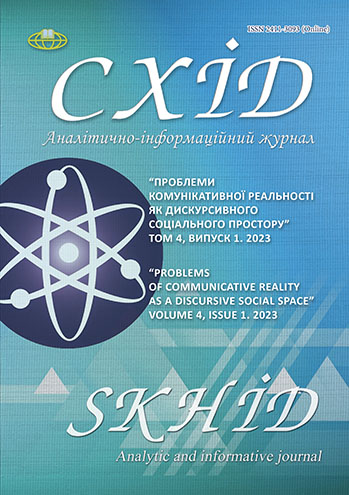Ukrainian feminism as a factor of social changes
DOI:
https://doi.org/10.21847/2411-3093.2023.4(1).276477Keywords:
feminism, social changes, Ukrainian life world, forms of sociality, national specificity of Ukrainian feminismAbstract
The article discusses the theoretical foundations of Ukrainian feminism, substantiates its practical significance for social changes in society. The subject of research attention is the individual and collective dimensions of feminism, the influence of this important social phenomenon on the value evolution of Ukrainian society. Attention is focused on the goal-rational and value-rational dimensions of the women's community, its moral and normative foundations. The role of the Ukrainian lifeworld in the value demarcation of Ukrainian women from imperial sociality is understood.
Emphasis is placed on the European social prerequisites of Ukrainian feminism, its consistency with liberal and communitarian ideas. The fundamental methodological approaches of representatives of postcolonial studies and critical social theory are analyzed. The national specificity of Ukrainian feminism as a social alternative to the distorted imperial forms of sociality is noted. Synthesized are theoretical and practical approaches that interpret feminism as a complex social phenomenon that has rational and sensual components. The reasons for the predominance of sensuality in the conditions of total alienation and its conditioning by historical factors are explained.
Downloads
References
Bogachevska-Khomyak, M. (1995). Bilyy po bilomu: zhinky v hromadskomu zhytti Ukrayiny, 1884-1939 [White on white: women in the public life of Ukraine, 1884-1939]. Kyiv, Lybid (In Ukrainian).
Bogachevska-Khomyak, M. (1993). Duma Ukrayiny – zhinochoho rodu. Kyiv, Voskresinnya (In Ukrainian).
Habermas Y. (2000). Structural transformations in the field of openness: research on the civil society category (trans from Eng.). Lviv, Litopys (In Ukrainian).
Hundorova, T. (2013). Pislyachornobylska Biblioteka. Ukrayinskyy literaturnyy postmodernizm. Kyiv, Krytyka (In Ukrainian).
Hundorova, T. (2002). Femina melancholika. Stat i kultura v henderniy utopiyi Olhy Kobylyanskoyi. Kyiv, Krytyka, pp.86–125 (In Ukrainian).
Taran, Lyudmyla (comp.) (2002). Zhinka yak tekst. Emma Andriyevsʹka, Solomiya Pavlychko,Oksana Zabuzhko: frahmenty Tvorchosti i konteksty. Kyiv, Fakt (In Ukrainian).
Lebid-Vinnytska, I. (1981). Suchasnyy modernyy svit i ukrayinska zhinka. Zhinochyy svit, 2–5 (In Ukrainian).
Lypa, Yu. (1994). Pryznachennya Ukrayiny. Lviv, Prosvita (In Ukrainian).
Lyaturinska, O. (983). Coll Works. Toronto (In Ukrainian).
Kobylyanska, O. (1995). Collection of works in 8 vols. Volume 5 (In Ukrainian).
Kolodiy, A. (2002). Na shlyakhu do hromadyanskoho suspilstva. Lviv (In Ukrainian).
Kis, O. (2008). Zhinka v tradytsiniy ukrayinskiy kulturi (druha polovyna ХІХ stolittya-pochatok ХХ stolittya). Lviv, Instytut narodoznavstva NAN Ukrayiny (In Ukrainian).
Pluckrose, Helen, Lindsay, James. (2022). Cynical Theories of Gender, Race, and Identity. And why they are bad for us all (Transl. from Englisch). Kyiv, Nasch Format (In Ukrainian).
Bellah, Robert ((1991). Good Society. New York, Knopf.
Elder, G. H. & Hitlin, S. (2007). Time, self and curiously abstract of concept of agency. Sociological Theory. (Hoboken: Wiley, American Sociological Association), 25 (2), 170–191.
Flax, J. (1990). Postmodernism and Gender Relations in Feminist Theory. In: Nicholson, L.J. (ed.) Femi-nism / Postmodernism. New York-London, Rutledge.
Fraser, N. (2010). Scales of Justice. Reimaging Political Space in a Globalizing World. New York, Columbia University Press.
Menig, L. (2018). Mary Wollstonecraft - first philosopher of feminism. Skhid, 5(157), 17–24. https://doi.-org/10.21847/1728-9343.2018.5(157).148353
Nussbaum, M.C. (2007). Frontiers of Justice. Disability, Nationality, Species Membership, Harvard University Press.
Pilcher, Jane and Whelehan, Imedla (2017). Key Con-cepts in Gender Studies. Los Angeles.
Sen, A. (198). Poerty and Famines, An essay on Entitle-ment and Deprivation. Clarendon Press, Oxford.
Spivak, Gayatry Chakravotry (1988). Can the Subaltern Speak? In: Gary Nelson (Еd.) and Lawrence Grossberg (ed.) Marxism and the interpretation of cul-ture. Chicago, University of Illinois Press https://jan.ucc.nau.edu/~sj6/Spivak%20CanTheSubalternSpeak.pdf
Downloads
Published
How to Cite
Issue
Section
License
Copyright (c) 2023 Ярослав Пасько, Ірина Зайцева

This work is licensed under a Creative Commons Attribution-NonCommercial-NoDerivatives 4.0 International License.
1. Authors bear responsibility for the accuracy of facts, quotations, numbers and names used.
2. Manuscripts are not sent back.
3. The publisher does not always agree with the authors' opinion.
4. The authors reserve the right to authorship of the work and pass the first publication right of this work to the journal under the terms of a Creative Commons Attribution-NonCommercial-NoDerivatives 4.0 International License. This license allows others to distribute (copy) the published work for non-commercial purposes, provided there is mandatory attribution to its authors and a link to the first publication in our journal.
5. The authors have the right to conclude separate supplement agreements that relate to non-exclusive work distribution in the form in which it has been published by the journal (for example, to upload the work to the online storage of the journal or publish it as part of a monograph), provided that the reference to the first publication of the work in this journal is included.

